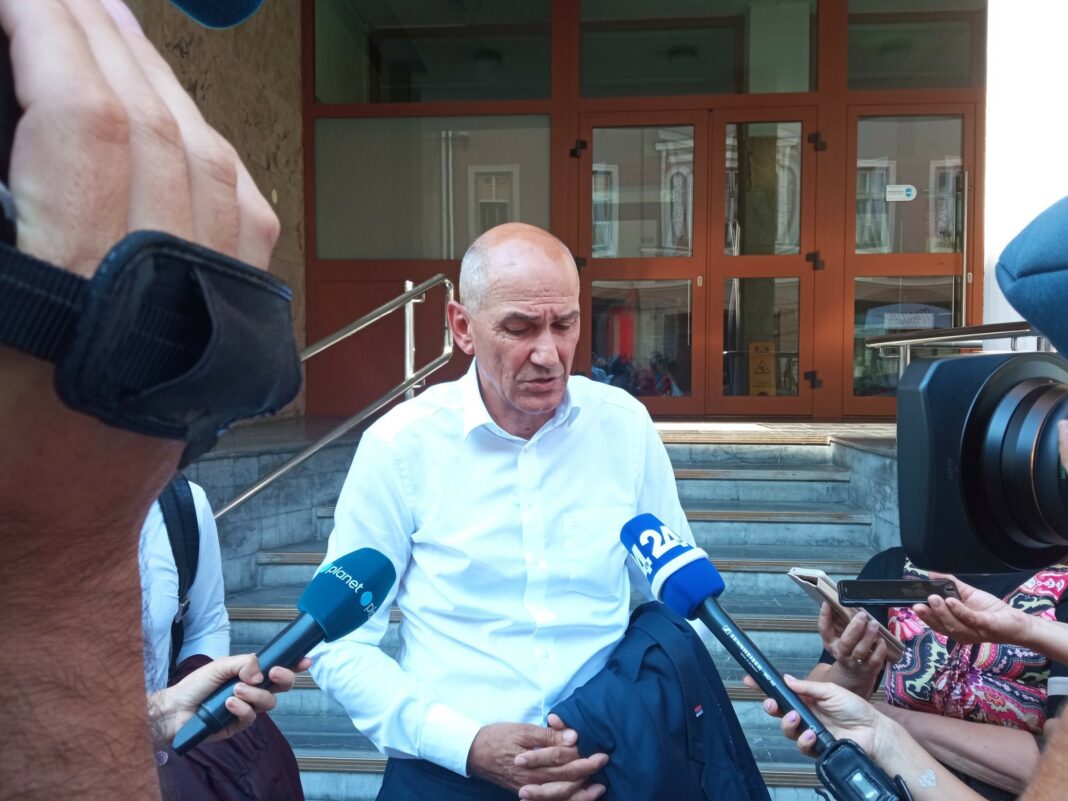By: Tanja Brkić (Nova24TV.si)
“Leftist strategists have apparently decided that their only option to win next year’s election is to once again unjustly imprison Janez Janša, just like in 2014,” says Aleš Primc, who also led the Committee 2014. Gorazd Pučnik also believes this “campaign” is senseless, while legal expert Andrej Fink reiterates that it is a political construct and wonders how to present this to the public so they will finally understand.
Closing arguments scheduled at the Celje court in connection with the “Trenta” case, which means the case is ready for a verdict. At the same time, at 12 PM, a large protest titled “Continuation of the Resistance Against the Injustice System” will take place in front of the court – expected to be the largest so far.
Constitutional lawyer Dr Andrej Fink believes that in a serious democracy, people should not be gathering in front of courthouses to protest against judges. Judges are, in theory, incorruptible and impartial. But in his view, the situation is quite the opposite in Slovenia. He even considers the Trenta case to be a far-fetched construct, but the challenge, he says, lies in proving this to the European public.
He also finds the case troubling because, in the event of a conviction, it would set a precedent showing that this could happen to practically anyone – “clearly to anyone perceived as a threat to the other side, even more so to an ordinary person, because the public would not even know about it,” he emphasises. He adds that Janša remains a thorn in their side especially due to the upcoming referendum scheduled for May 11th. “They are furious because they could lose it, and now they are putting pressure on this case.”
The lawyer states that such protests would not occur in a healthy democracy, but that “our democracy is not healthy – that is the problem. And it is unhealthy because it is still influenced by those old powers,” he concludes.
Pučnik: This weakens our society
Gorazd Pučnik, son of Slovenian independence figure and dissident Jože Pučnik, initially emphasised that this is a long-standing issue on which he has expressed his opinion many times. In his view, it is senseless that the case is still ongoing. What is striking, he says, is how the situation seems to be repeating itself – especially now that the government appears to be revisiting the Patria case. “This repetition saddens me because it shows that the level of political conflict, although legitimate, is extremely low,” he says. He went on to quote renowned prosecutor Giovanni Falcone, saying that “an indictment must be clear and, if possible, indisputable.” In a society where an institution accuses someone, people often assume there must be something serious behind it. But, as Falcone said, the indictment must be clear and indisputable, as that upholds the value of the state; otherwise, such accusations can erode society, Pučnik explains.
He says he has lost track of how many times Janša has been sued and then actually charged, and believes that the court is relying on slander, which leads to quarrels and the general public perception that someone is simply “bad.” When asked whether a parallel can be drawn between Jože Pučnik and Janez Janša in the sense that both were persecuted for resisting a “socialist” regime, Pučnik says only partially – since democracy has since emerged, which should not allow such parallels. Still, he often asks himself who is actually contributing to this situation. He is unsure how things differ from the time Janša was imprisoned – convicted without a real chance to defend himself – but notes that past debates were longer and more direct.
In conclusion, Pučnik observes that nowadays, things unfold in a more insidious way. “In the past, at least things happened more directly, whereas now they can be more complex. None of this is specifically tied to the current government; these are patterns that keep repeating in our system,” he notes. One of the weaknesses this situation presents for democracy, he says, is the tendency to prosecute the same issues repeatedly. He explains that when a process is never fully completed, those in power can keep using the same methods. Pučnik remarks that given the current circumstances, the present government does not have the best reputation and that everything is repeating, just as it has many times before. “I hope we can learn something from past experiences,” he concludes.
Primc: The target is not Janša – It is the ordinary people
Leader of the Committee 2014, which was established at the time of the Patria case (widely regarded by supporters as a political construct), meanwhile notes that left-wing strategists have concluded that their only path to victory in next year’s election is once again imprisoning Janez Janša, as they did in 2014. He claims they are abusing the prosecution and judiciary to do so, which will cause great suffering for Janša’s family – especially his children and wife, Urška. However, Primc warns that the real target of this operation is not the Janša family, but the ordinary people – because it is about their pensions, property, safety, and health. He stresses the following:
“They want to seize control of the budget for another four years – our money – for their own interests. And just like in 2014, Janez Janša is the biggest obstacle in their way. We all need to understand this – left and right. The attack on Janez Janša is an attack on our wallets, our pensions, our safety, and our health. That is why everyone is invited to join the mass gathering in front of the Celje courthouse at 12 PM!”

